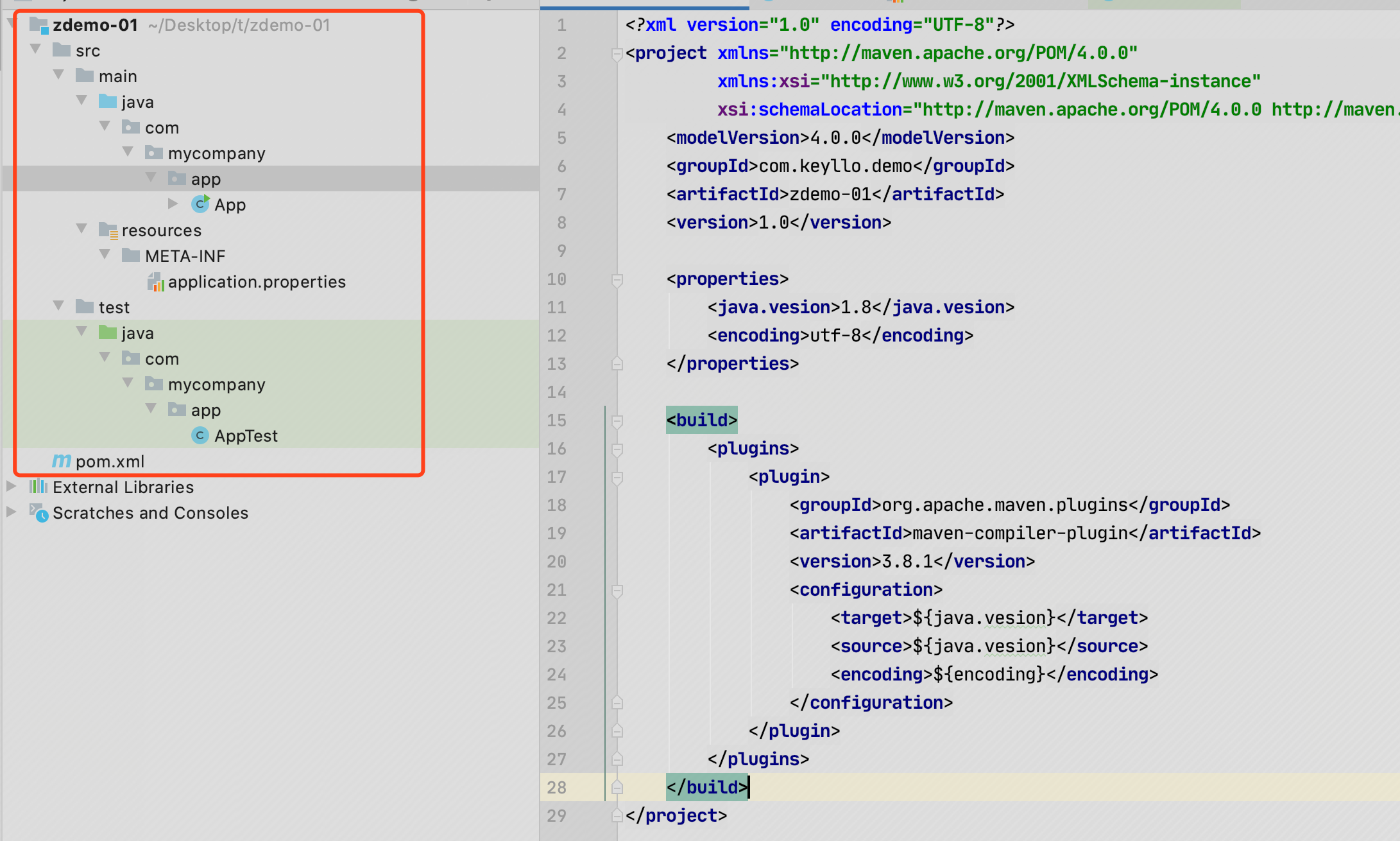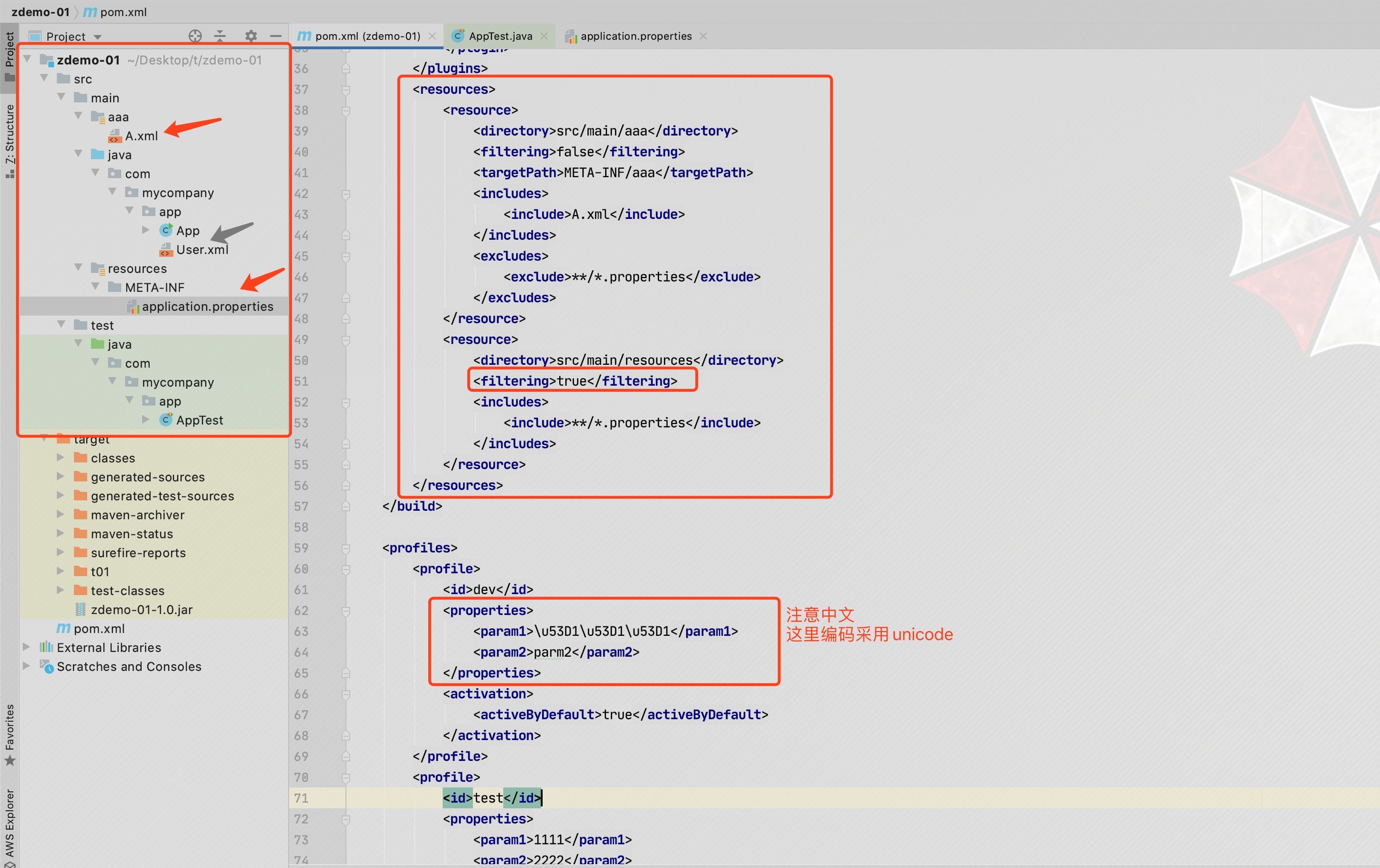默认打包测试 根据 Maven 的默认项目结构,资源文件放置在 src/main/resources 中,测试的资源文件在 src/test/resources 中。放置在 src/main/resources 中的资源文件默认会被打包进 jar 中。
注:如果配置文件放置在src/main/resources 下,则默认打包后该配置文件位于jar包的根目录下;
如果配置文件放置在src/main/resources/aaa 下,则默认打包后该配置文件位于jar包的根目录下的/aaa目录下;
如果配置文件放置在src/main/resources/META-INF 下,则默认打包后该配置文件位于jar包的根目录下的 /META-INF目录下;
例如我们有如下的目录结构,其中在 src/main/resources 中有一个资源文件 application.properties 在 META-INF 中:
我们将上面的项目进行打包,然后将 jar 解压之后我们可以看到如下的目录:
1 2 3 4 5 6 7 8 9 10 11 12 13 . ├── META-INF │ ├── MANIFEST.MF │ ├── application.properties │ └── maven │ └── com.keyllo.demo │ └── zdemo-01 │ ├── pom.properties │ └── pom.xml ├── com └── mycompany └── app └── App.class
如上所示,我们可以发现项目中的 src/main/resources 目录中的文件会被打包在项目根目录(META-INF)中。这里多出来的 pom.properties 跟 pom.xml 是 Maven 在打包的时候默认生成的,当然你可以创建你自己的打包清单。
但有时候,我们的资源文件没有全部放置的 src/main/resources 中,比如 Mybatis 的映射文件有时候会直接放置在相关的类包中,这时候默认的打包就不会将这些映射文件打包进 jar 中,引用该 jar 的其他项目在使用相关的类就会报错。这时候我们就需要指定需要打包的资源文件。有几种方法,下面我们分别介绍。
使用 resources 标签 标签位于 标签内,用于指定项目资源文件的位置。例如,我们有一个 A.xml 文件,我们的项目要求这个文件打包后位于 META-INF/aaa 中,虽然我们可以将其放置在 src/main/resource/META-INF/aaa 中,但我们给了这个文件自己的目录 src/main/aaa ,为了将其正确地打包进 jar 中,我们可以使用如下的配置:
directory:源代码资源文件所在的目录
filtering:是否筛选资源以用参数化值替换标记${xxx}。这些值取自全局properties 或环境 properties 以及 filters 元素中列出的属性。targetPath:放置资源文件的目录,默认是根路径
includes:需要包含的资源文件列表
excludes:需要排除的资源文件列表
testResources:测试资源文件列表,配置类似 resources
打包后jar包的文件结构:
1 2 3 4 5 6 7 8 9 10 11 12 13 14 15 . ├── META-INF │ ├── MANIFEST.MF │ ├── aaa │ │ └── A.xml │ ├── application.properties │ └── maven │ └── com.keyllo.demo │ └── zdemo-01 │ ├── pom.properties │ └── pom.xml ├── com └── mycompany └── app └── App.class
使用 resources 插件 Apache Maven Resources Plugin 有 3 个 goals,分别是:
resources:resources
resources:testResources
resources:copy-resources
当我们配置 标签的时候,resources:resources 目标就会使用到 中的配置,如果不配置 ,我们可以使用 resources:copy-resources 目标,这里我将其绑定在 process-resources 阶段中。
1 2 3 4 5 6 7 8 9 10 11 12 13 14 15 16 17 18 19 20 21 22 23 24 25 26 27 28 29 30 31 32 33 34 35 36 37 <plugin > <groupId > org.apache.maven.plugins</groupId > <artifactId > maven-resources-plugin</artifactId > <version > 3.1.0</version > <executions > <execution > <id > my-resources</id > <phase > process-resources</phase > <goals > <goal > copy-resources</goal > </goals > <configuration > <outputDirectory > ${project.build.outputDirectory}</outputDirectory > <resources > <resource > <directory > src/main/aaa</directory > <filtering > false</filtering > <targetPath > META-INF/aaa</targetPath > <includes > <include > A.xml</include > </includes > <excludes > <exclude > **/*.properties</exclude > </excludes > </resource > <resource > <directory > src/main/resources</directory > <filtering > true</filtering > <includes > <include > **/*.properties</include > </includes > </resource > </resources > </configuration > </execution > </executions > </plugin >
注意:这种方式在手动执行测试方法时 resource-filtering 标签不起作用,但是执行maven test任务或maven打包的时候resource-filtering 标签会起作用。
使用 filters 配置外部属性 例如我们有一个属性文件 src/main/filters/myfilter.properties
然后,我们需要在 pom.xml 中为这个文件增加一个引用
也可以指定这样配置不同的环境参数,根据全局properties参数 或 根据java运行时参数进行配置:
运行测试:
1 2 3 4 5 6 7 8 9 10 11 12 13 14 15 $ mvn test -Dprofile=sit -Dtest=Test01 [INFO] --- maven-surefire-plugin:2.12.4:test (default-test) @ zdemo-spring --- [INFO] Surefire report directory: /Users/zhangqingli/gitrepors/zdev/zdemo-spring/target/surefire-reports ------------------------------------------------------- T E S T S ------------------------------------------------------- Running Test01 jdbc:mysql://xxx:3306/xxx?useUnicode=true &serverTimezone=Hongkong Tests run: 1, Failures: 0, Errors: 0, Skipped: 0, Time elapsed: 0.607 sec Results : Tests run: 1, Failures: 0, Errors: 0, Skipped: 0



